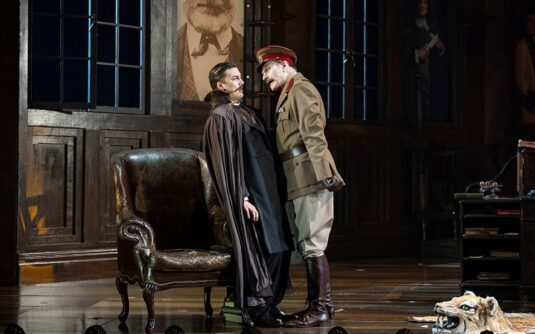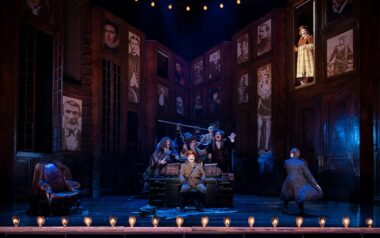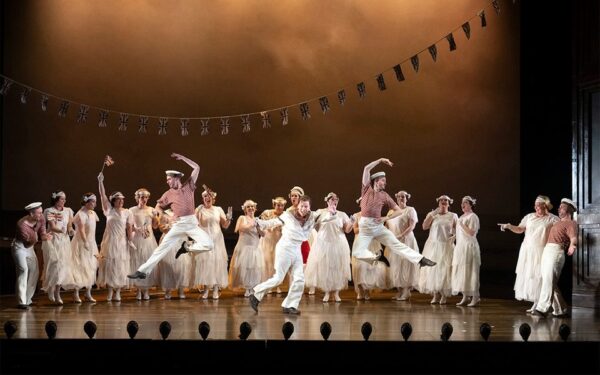 United Kingdom Opera North 2024 [2] – Gilbert & Sullivan, Ruddigore (or The Witch’s Curse): Soloists, Chorus and Orchestra of Opera North / Anthony Kraus (conductor). Lyric Theatre, The Lowry, The Quays, Salford, 14.11.2024. (MC)
United Kingdom Opera North 2024 [2] – Gilbert & Sullivan, Ruddigore (or The Witch’s Curse): Soloists, Chorus and Orchestra of Opera North / Anthony Kraus (conductor). Lyric Theatre, The Lowry, The Quays, Salford, 14.11.2024. (MC)

It was well over a decade ago since I last saw a staging of Gilbert and Sullivan’s two act comic opera Ruddigore. Having seen and enjoyed numerous Opera North productions in recent years my expectations were high for Ruddigore at The Lowry, Salford. I had missed stage director Jo Davies’s highly acclaimed 2010 production of Ruddigore for Opera North, so I was delighted to see its revival, directed here by James Hurley. A year ago, I recall Hurley’s outstanding La rondine for Opera North at Salford (review here).
The partnership of composer Arthur Sullivan and librettist W. S. Gilbert had triumphed with The Mikado and less than two years later they produced Ruddygore the tenth opera of their collaboration. Both works were premiered at the Savoy Theatre in 1885 and 1887 respectively. Ruddygore was poorly received prompting Gilbert and Sullivan to make revisions including cuts, and they changed the name to Ruddigore and gave the revival in 1920. Over time opinions over the merit of Ruddigore changed more favourably.
Normally described as a comic opera Ruddigore is a parody of the standard Victorian melodrama, owing to the witches’ curse and ancestral ghosts and is sometimes referred to as a ‘supernatural opera’. I will not be the first to say that the events at Ruddigore Castle reminded me of the popular TV series The Addams Family and The Munsters both launched in 1964. Set in Rederring, a small Cornish fishing village, the plot concerns the blighted baronets of Ruddigore who have the family name Murgatroyd with Ruddigore Castle as the baronial seat. A witch has cursed the Ruddigore baronets who must commit at least a crime each day forever or experience an agonising death.
The true Baronet is Sir Ruthven Murgatroyd, who has opted out to avoid the curse and has assumed the identity of Robin Oakapple, a simple farmer. As Ruthven is thought to be dead, his younger brother Despard as the next in succession becomes the baronet Ruddigore. Despard discovers the truth that Robin is really his elder brother Ruthven. Robin is set to marry his betrothed Rose Maybud when his real identity as the true Ruddigore heir is revealed.

Originally set in the early 1800s director Jo Davies brought the work forward to around the early 1920s, by the look of the clothes. In the programme notes I notice that Richard Stilgoe is credited with some additional lyrics. During the overture there was a silent film type of introduction to the Murgatroyd clan that was suitably grainy, but the lettering was difficult to read clearly. I was markedly drawn to the second act, set in the Picture Gallery of Ruddigore Castle, which was a credit to designer Richard Hudson, the basis of one of the most remarkable, and enjoyable scenes I have seen in any comic opera. I noticed Anna Watson kept the lighting dim and the illusions created by Paul Kieve made a real impact. Here the portraits of past Ruddigore baronets, hung from top to bottom on the gallery walls, came to life in a riot of voices, images and activity. As one of the Murgatroyd clan, one actor could be seen hanging precariously out of his picture frame high up on the wall. After all this activity the narrative gradually unwound to its happy ending.
Without a weak link in the cast there are however several individuals that I wish to single out for special praise. The role of Sir Ruthven Murgatroyd aka Robin Oakapple was taken by assured baritone Dominic Sedgwick who was fully immersed in the role. Robin’s foster brother is the happy-go-lucky sailor Dick Dauntless, the epitome of a Jolly Jack Tar. Played with merit by tenor Xavier Hetherington who communicated his humour so well.
Found on workhouse steps, Rose Maybud has grown to become a prim and proper spinster much in demand by village bachelors. In this revival soprano Amy Freston took the role of Rose, as she had dome fourteen years ago in Jo Davies’s original 2010 production. Stylishly dressed in the attire of the day, Freston relished the role that suited her down to the ground. There was a freshness to her voice, and she managed to portray a certain naivety to her character.
A video and TV special of Ruddigore filmed in 1982 was shown on BBC 2 in 1987. I notice that none other than Vincent Price played Sir Despard Murgatroyd. Here Sir Despard was sung by John Savournin, a G&S enthusiast since a young man and a natural comedian, used his bass-baritone most effectively. He certainly looked splendid dashing around in his dark cloak, top hat, greased back hairstyle and carrying a walking stick. Mad Margaret, an outsider who has been cruelly treated, has an obsessive love for Sir Despard. Taken by mezzo-soprano Helen Évora I did especially enjoy the amusing encounter between Rose and Mad Margaret, dressed in all dark brown with large, veiled hat and coat. In the end Margaret does marry Sir Despard.
Looking mightily impressive marching around in his First World War General’s uniform the role of Sir Roderic Murgatroyd was taken by baritone Steven Page whose acting was top drawer. Bass-baritone Henry Waddington had the role Old Adam Goodheart, servant to Robin Oakapple. In Act I Goodheart was the loyal servant personified, yet in Act II he changes temperament becoming a horrible piece of work. With only modest singing opportunities Waddington’s voice was underused, yet his significant stage presence is a joy to behold.
Opera North chorus deserve acclaim singing with unison and impressive reserves of energy. Conducted by Anthony Kraus the Orchestra of Opera North sounded in fine form with many effective solo contributions. For the revision of Ruddigore composer Geoffrey Toye wrote a new overture, however Kraus stuck to Sullivan’s original. There wasn’t much dancing to see yet Kay Shepherd choreographed a lovely sailor and bridesmaids routine that was well received.
I cannot agree with the writer who expressed the view that whilst Ruddigore was not first rank G&S it was more of a connoisseur’s choice. As far as entertainment goes Opera North has provided top-drawer G&S. Chicanery and lampooning abound, patter songs and deception, namely Robin Oakapple’s assumed identity. Expressions of joy could be clearly seen on many audience faces.
At The Lowry, Opera North’s captivating performance of Ruddigore exceeded my already high expectations.
Michael Cookson
Featured Image: Xavier Hetherington (centre, Richard Dauntless) with dancers George Bishop (l) and Ben Yorke-Griffiths (r) and members of the Chorus of Opera North © Richard H Smith
Production:
Stage director – Jo Davies
Revival director – James Hurley
Sets – Richard Hudson
Costumes – Gabrielle Dalton
Lighting – Anna Watson
Choreography – Kay Shepherd
Illusionist – Paul Kieve
Cast:
Sir Ruthven Murgatroyd / Robin Oakapple – Dominic Sedgwick
Richard Dauntless – Xavier Hetherington
Sir Despard Murgatroyd – John Savournin
Old Adam Goodheart – Henry Waddington
Sir Roderic Murgatroyd – Steven Page
Rose Maybud – Amy Freston
Mad Margaret – Helen Évora
Dame Hannah – Claire Pascoe
Zorah / Ruth – Gillene Butterfield
